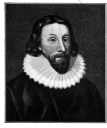
Selected Bibliography on Puritanism
- Bibliography at Paul Reuben's PAL site.
- "The American Sense of Puritan" by Scott Atkins of the University of Virginia's American Studies Group
- The Winthrop Papers. Description and transcriptions of the papers at the Winthrop Papers Web Archive.
- Sacvan Bercovitch, "A Model of Cultural Transvaluation: Puritanism, Modernity, and New World Rhetoric"
- David Williams (George Mason University), "John Winthrop and the Origins of American Multiculturalism:A Plea against Balkanization"
- "Remembering and Forgetting John Winthrop," an audio interview on Winthrop's significance by Francis J. Bremer, editor of the Winthrop Papers.

- "Was John Adams Have Called John Winthrop a Founding Father?" An "Ask the Author" essay by Bremer at Common-Place.

"A
Model of Christian Charity" (c. 1630)
"On
Liberty" (1645)
"Christian Experience"
Excerpts from Winthrop's journal
The most famous section of "A Model of Christian Charity" is the idea of New
England as a "City upon a Hill." Here is the passage (excerpted from the online
copy at Hanover College; bold type added):
Thus stands the cause betweene God and us. We are entered into Covenant with Him for this worke. Wee haue taken out a commission. The Lord hath given us leave to drawe our own articles. Wee haue professed to enterprise these and those accounts, upon these and those ends. Wee have hereupon besought Him of favour and blessing. Now if the Lord shall please to heare us, and bring us in peace to the place we desire, then hath hee ratified this covenant and sealed our Commission, and will expect a strict performance of the articles contained in it; but if wee shall neglect the observation of these articles which are the ends wee have propounded, and, dissembling with our God, shall fall to embrace this present world and prosecute our carnall intentions, seeking greate things for ourselves and our posterity, the Lord will surely breake out in wrathe against us; be revenged of such a [sinful] people and make us knowe the price of the breache of such a covenant.
Now the onely way to avoyde this shipwracke, and to provide for our posterity, is to followe the counsell of Micah, to doe justly, to love mercy, to walk humbly with our God. For this end, wee must be knitt together, in this worke, as one man. Wee must entertaine each other in brotherly affection. Wee must be willing to abridge ourselves of our superfluities, for the supply of other's necessities. Wee must uphold a familiar commerce together in all meekeness, gentlenes, patience and liberality. Wee must delight in eache other; make other's conditions our oune; rejoice together, mourne together, labour and suffer together, allwayes haueving before our eyes our commission and community in the worke, as members of the same body. Soe shall wee keepe the unitie of the spirit in the bond of peace. The Lord will be our God, and delight to dwell among us, as his oune people, and will command a blessing upon us in all our wayes. Soe that wee shall see much more of his wisdome, power, goodness and truthe, than formerly wee haue been acquainted with. Wee shall finde that the God of Israell is among us, when ten of us shall be able to resist a thousand of our enemies; when hee shall make us a prayse and glory that men shall say of succeeding plantations, "the Lord make it likely that of New England ." For wee must consider that wee shall be as a citty upon a hill. The eies of all people are uppon us. Soe that if wee shall deale falsely with our God in this worke wee haue undertaken, and soe cause him to withdrawe his present help from us, wee shall be made a story and a by-word through the world. Wee shall open the mouthes of enemies to speake evill of the wayes of God, and all professors for God's sake. Wee shall shame the faces of many of God's worthy servants, and cause theire prayers to be turned into curses upon us till wee be consumed out of the good land whither wee are a goeing.